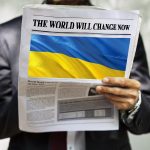Adam Plowright und Didier Lauras, AFP, n.tv translated by Theresa Zettl
Despite global criticism and tough sanctions, Moscow continues its attack on Ukraine. From the perspective of Western governments and experts, five possible scenarios emerge for the coming weeks and months:
Scenario 1: Military stalemate
So far, Ukrainian forces have resisted the Russian invasion: An attempt to capture the capital, Kiev, with paratroopers was repelled in the first days of the war. Other key cities, such as Kharkiv and Mariupol, also remain under Ukrainian control.
Many Ukrainians have joined defense units. With the help of Western weapons and intelligence, Ukrainian troops may be able to hold out in Kiev and force a military stalemate.
Weakening the Russian economy with punitive measures could force President Vladimir Putin to change his calculus. “The West could use its sanctions to persuade Putin to abandon his central wartime objective of decapitating the Ukrainian government and installing a pro-Russian puppet,” writes Samuel Charap of the U.S. think tank Rand Corporation.
Scenario 2: Domestic political change in Russia
The likelihood of a popular uprising or coup bringing Putin down seems low at present; however, observers do not rule out the possibility. The Kremlin is cracking down on independent and foreign media and trying to consolidate the opinion supremacy of the ultra-loyal state media.
Nevertheless, smaller anti-war demonstrations took place in many places, and at least 6,000 people were arrested, according to human rights organizations. Support for Putin is also crumbling among the ruling elite, with some oligarchs, members of parliament and even the private oil company Lukoil calling for an end to the fighting.
“Putin’s personal security is very good and will continue to be very good – until it’s not,” said Eliot A. Cohen of the think tank Center for Strategic and International Studies. “This has happened many times in Soviet and Russian history.”
Scenario 3: Russian military success
Given their military superiority, Western defense experts expect Russian troops to advance further. French President Emmanuel Macron concluded after a phone call with Putin on Thursday morning that “the worst is yet to come.” Putin wants to “take control of all of Ukraine,” he said.
But even if Russian troops depose Ukrainian President Volodymyr Zelensky and break Ukrainian resistance, Moscow would face the challenge of occupying a country of 40 million people. “Invading a city is not the same as holding it,” writes British war historian Lawrence Freedman of King’s College in London.
Scenario 4: Expansion of the conflict
Ukraine borders four former Eastern Bloc countries that are now members of NATO. If one member is attacked, it is considered an attack on the entire defense alliance. Hardly any expert expects Putin to attack a NATO member directly and thus risk a nuclear war. However, provocations are conceivable.
Political scientist Charap warns of the “risks of an accident, incident, or miscalculation that could lead to war between NATO and Russia.” For example, a stray missile or cyberattack could be triggers for an expansion of the war.
Putin’s ideal of a Soviet-scale Russia and his promise to protect Russian minorities raise fears of further territorial ambitions. After Ukraine, Moscow could also target the once-Soviet Republic of Moldova, it is speculated.
Scenario 5: Confrontation with NATO
The strategy of deterrence with nuclear weapons has reached a new dimension since the Ukraine war.
A direct confrontation between NATO and Russia has been ruled out so far, as it would result in nuclear war and mutual annihilation. However, Putin threatened the West with nuclear weapons by putting the nuclear deterrent forces on alert.
Western observers believe such threats are intended to deter the United States and Europe from considering interventions such as a no-fly zone over Ukraine. “These announcements are primarily aimed at a Western audience to scare us and unsettle our societies,” says Gustav Gressel, an expert on missile defense at the think tank European Council on Foreign Relations. “They are insubstantial.”
Author Profile
-
Co-Founder of European Liberals for Reform
Chairperson of ELfR Working Group Health
ALDE Individual Members Steering Committee Member (2022-2023)
Social Media & Digital Marketing Expert, Blogger
Favorite Topics: Health, Society, LGBTQI
Latest entries
 Elections13/04/2022Presidential elections in France 2022
Elections13/04/2022Presidential elections in France 2022 Human Rights22/03/2022ELfR to support Manifesto for inclusive gender-based violence law
Human Rights22/03/2022ELfR to support Manifesto for inclusive gender-based violence law EU07/03/2022Five possible scenarios for the outcome of the Ukraine war
EU07/03/2022Five possible scenarios for the outcome of the Ukraine war Ukraine06/03/2022ELfR starts petition to nominate Volodymyr Zelenski for Sakharov Prize
Ukraine06/03/2022ELfR starts petition to nominate Volodymyr Zelenski for Sakharov Prize
Post Disclaimer
The opinions expressed by the author of this post do not necessarily represent the opinions and policies of ELfR.

